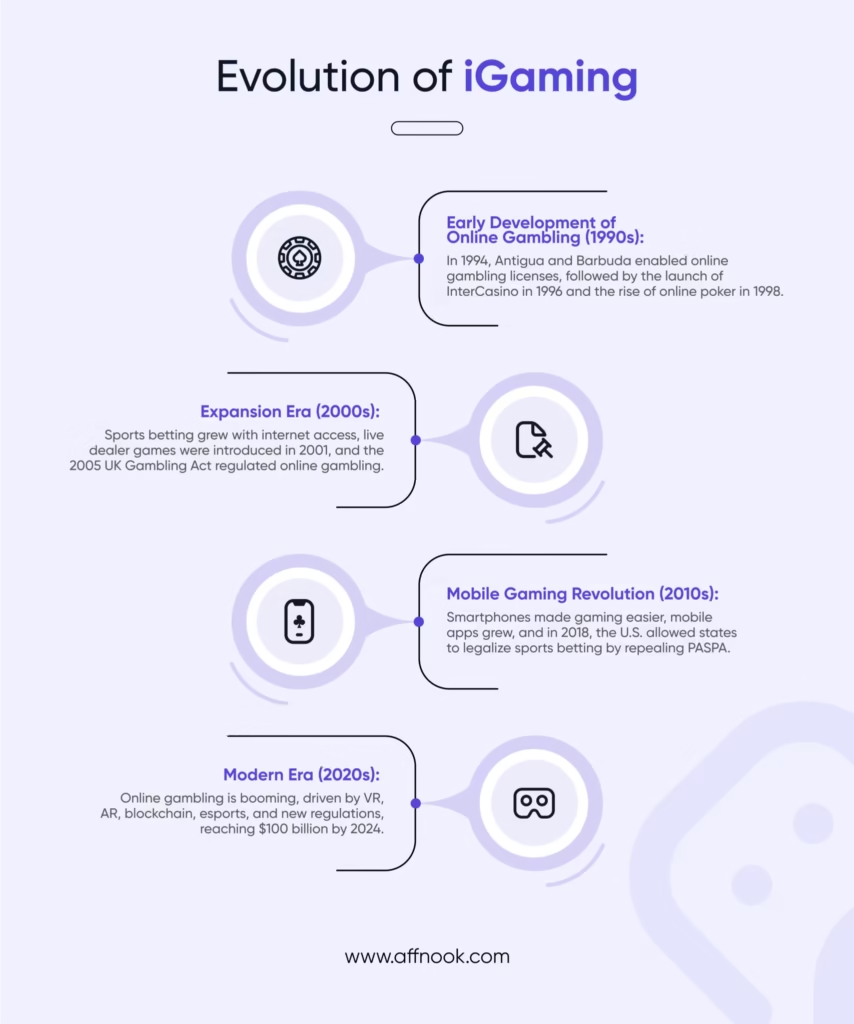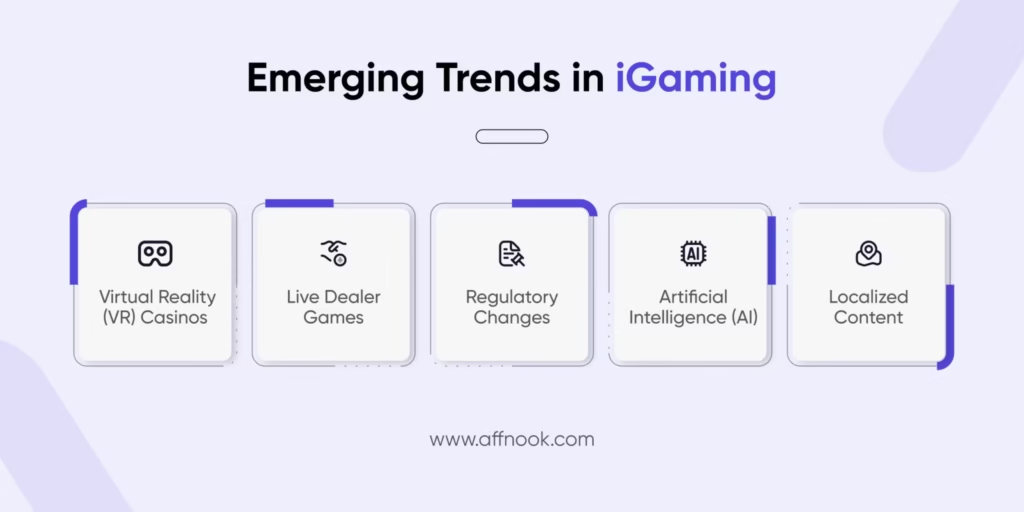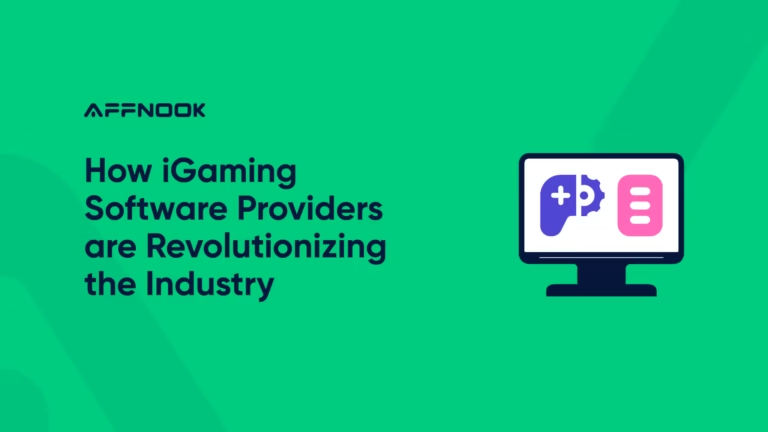The iGaming industry is changing the face of entertainment as we know it, attracting millions of players from every part of the world through mobile gaming and cloud gaming platforms. From bets on live football matches to spinning the slot wheel, the reach of iGaming is unpredictable and heavily shaped by evolving market trends and user experience innovation.
According to Statista, the Online Gambling market is expected to generate US$3.20bn in revenue by 2025, with a projected annual growth rate (CAGR 2025-2029) of 4.94%, reaching US$3.88bn by 2029. Let’s explore the numbers and trends powering this impressive growth.
What is the iGaming Industry?
The iGaming industry is a combination of online gaming and gambling, supported by advanced payment gateways.
With the help of blockchain technology, regulation, and payment systems, the industry is able to operate more efficiently and securely in the digital age while strengthening cybersecurity. It contains various activities like sports betting, online casinos, and many virtual games that increasingly rely on gamification and enhanced user experience.
This industry operates under strict rules and regulations by the government bodies that are responsible for fair play, regulatory compliance, and customer protection.

Importance of Understanding iGaming’s Market Size
Understanding the market size of the iGaming industry is important for various reasons, as it provides valuable insights for better opportunities and data analytics-driven decision-making.
- Investment Insights: Knowing the size of the market helps stakeholders and operators to identify potential opportunities and risks related to customer acquisition and player acquisition. It helps them decide where to invest money and which areas offer the best chances for growth.
- Growth Potential: By understanding the size of the market, businesses can predict and analyze future trends, making informed decisions about where to expand or identify areas for investment.
- Competitive Strategy: Proper insight into the market size helps businesses understand their position relative to competitors. They can use this information to improve their offerings, highlight their unique strengths, and stand out in the crowded iGaming space.
- Risk Management: Understanding the market size helps businesses spot potential risks, like oversaturation or shifting regulations, and lets them plan with strategies to tackle these challenges.
- Targeting the Right Audience: Knowing the market size helps businesses better understand their audience. This insight helps them to enhance their marketing strategies, including affiliate marketing and offerings, to better connect with different groups of players.
- Regulation and Policy Development: For governments and regulators, knowing the market size is important to develop fair rules that protect players and ensure responsible gaming while allowing businesses to grow under clearly defined regulatory bodies.
Which Regions Dominate the iGaming Industry
The iGaming industry is dominated by various regions, each regions have unique characteristics and growth potential influenced by licensing jurisdictions. The key regions include:
Europe:
- Europe has built strong, safe, and solid regulations for online gambling. Countries like the UK and Malta have clear, player-friendly laws that support both operators and players.
- According to Statista European cybergame market is expected to generate US$84.91bn in revenue by 2025, with a projected annual growth rate (CAGR) of 7.36% from 2025 to 2029, reaching a market volume of US$112.80bn by 2029.
- On the other hand, the Online Gambling market is projected to generate US$49.96bn in revenue by 2025, with an expected annual growth rate (CAGR) of 3.83% from 2025 to 2029, reaching a market volume of US$58.06bn by 2029. Meanwhile, the Online Sports Betting market is forecast to generate US$12.66bn in revenue by 2025, with a projected annual growth rate (CAGR) of 4.44% from 2025 to 2029, culminating in a market volume of US$15.06bn by 2029. It has a diverse population, which means there are a variety of player preferences, which has encouraged operators to develop a wide range of gaming options to cater to different tastes and improve player retention.
North America:
- The United States and Canada are rapidly growing markets, particularly with the recent legalization of sports betting across various states. In the U.S., the Online Gambling market is projected to reach US$37.37bn in revenue by 2025, with an expected annual growth rate (CAGR) of 7.24%, reaching US$49.43bn by 2029. Similarly, the Online Sports Betting market is expected to generate US$17.23bn in revenue by 2025, with a projected CAGR of 8.41%, resulting in a market volume of US$23.80bn by 2029.
Asia-Pacific:
- Asia is rapidly emerging as one of the fastest-growing markets in the iGaming industry. In 2023, the Asia-Pacific iGaming market was valued at approximately US$5.41 billion, and experts predict it will reach US$7.51 billion by 2029, growing at a (CAGR) of 5.63%. The Online Gambling market in the region is projected to generate US$6.26 billion in revenue by 2025, with an expected annual growth rate (CAGR) of 4.66%, culminating in a market volume of US$7.51 billion by 2029.
- Additionally, the Sports market in Asia is also seeing significant growth. Total revenue in this sector is projected to reach US$1.29 billion in 2022, with an anticipated CAGR of 6.14% from 2022 to 2029, resulting in a projected market volume of US$1.98 billion by 2029.
Latin America and Africa:
- Latin America is rapidly becoming a key player in the iGaming industry, with countries like Brazil, Mexico, and Argentina experiencing growth. In Brazil, the government has officially licensed betting and iGaming companies, and as more countries in the region introduce regulations for online gambling, the market’s potential continues to expand.
- The Online Gambling market in the region is projected to generate US$5.94 billion in revenue by 2025, with an expected annual growth rate (CAGR) of 10.04%, reaching US$8.71 billion by 2029. Similarly, the Online Sports Betting market is projected to generate US$2.77 billion in revenue by 2025.
iGaming Segments Contributing to Industry Size
The iGaming industry is a constantly evolving space, made up of various segments, each playing an important role in its overall growth. From popular online casinos to emerging areas like fantasy sports, these segments form the foundation driving the industry’s rapid expansion. Keeping track of iGaming trends within these segments helps operators and brands stay competitive and adapt to shifting player demands.
Online Casinos
Online casinos, including slots, are the largest revenue generators within the iGaming industry. According to Statista, it contributed nearly 45% to the industry’s total revenue in 2023. Online casinos also provide a wide demographic with classic games like blackjack, roulette, and baccarat, offering both live dealer experiences and automated options.
Sports Betting
Sports betting remains the backbone of the iGaming sector, accounting for around 30% of the industry’s revenue, with a projected market volume of US$2.19bn in 2025. The rise of in-play betting, along with seamless integration with live-streaming platforms, has made the experience more interactive and engaging for users, boosting customer retention.
eSports betting
The global Esports market is projected to reach US$4.8bn in revenue by 2025, with an expected annual growth rate (CAGR) of 5.54% from 2025 to 2029, reaching a market volume of US$5.9bn by 2029. The increasing popularity of competitive gaming, coupled with its appeal to a younger, tech-savvy audience, has made this segment a highly profitable opportunity for operators.
Poker and Bingo
Traditional games like poker and bingo remain popular in the online space, contributing around 12% to the industry’s revenue. To keep players engaged, platforms are introducing innovations such as multi-table tournaments, live-hosted bingo rooms, and interactive chat features, and loyalty programs enhancing the social aspects that make these games so appealing.
According to Statista Globally, there were 10,366 poker tables used in gambling locations in 2024, with North America leading the way with approximately 7,000 tables, followed by Europe with over 2,700 tables.
Fantasy Sports and Social Gaming
Fantasy sports and social gaming, are relatively new to the iGaming industry, and they are quickly gaining popularity. The fantasy sports segment, driven by platforms like DraftKings and FanDuel, generated $8 billion in revenue in 2022 and is expected to grow at a CAGR of 9% through 2030. Meanwhile, social gaming blends casual gaming with social features, offering a low-stakes environment that appeals to non-traditional gamblers, particularly in regions like North America and Asia-Pacific.
Emerging Trends in the iGaming Industry
- Virtual Reality (VR) Casinos: Virtual Reality gaming allows players to experience a fully immersive casino environment from the comfort of their homes. By wearing VR headsets, players can feel as though they are physically present in a casino, which enhances their gaming experience.
- Live Dealer Games: These games provide a more interactive and realistic online gaming experience. Players can engage with real dealers through video streaming, bridging the gap between traditional in-person casino games and online gaming.
- Regulatory Changes: As more countries recognize the potential of online gambling, they are introducing new laws to legalize and regulate the industry. This is creating more opportunities for operators and players in new markets while ensuring player protection and fair play.
- Artificial Intelligence (AI): AI is transforming the iGaming industry by helping with fraud detection, enhancing customer support through chatbots, and personalizing gameplay experiences. AI can analyze player behavior to offer tailored game recommendations and improve overall player engagement.
- Localized Content: As the iGaming market becomes more global, operators are focusing on offering culturally relevant games and payment options to cater to specific regions. This helps make the experience more appealing and accessible to a diverse player base.

Legalization and Regulation Changes
Legalization and regulation changes in the iGaming industry have had a powerful impact on its growth and development. As more countries and regions move to regulate and legalize online gambling, several key benefits and challenges emerge:
- Increased Market Access:-
Legalization allows operators to penetrate new markets, where they can offer their services to a wide range of audiences. The recent legalization of sports betting in the United States and Brazil’s decision to regulate iGaming have opened doors for operators, making the industry more accessible to both consumers and businesses. Once clear regulations are in place, companies can offer their services legally and safely, expanding the market by a huge margin. - Consumer Protection:-
Proper regulation ensures that gambling is conducted fairly and responsibly, it is very crucial to provide consumer protections that help prevent fraud, cheating, and exploitation. For instance, operators are required to adhere to licensing requirements, implement responsible gambling measures, and ensure the protection of sensitive data. This creates a safer and more trustworthy environment for players, which can help build consumer confidence and boost the market. - Tax Revenue Generation:-
Legalized and regulated iGaming markets allow governments to collect tax revenue from gambling activities. This revenue can be used to fund public services, infrastructure, and other community projects. For example, in the U.S., tax revenue from legal sports betting is being directed to support education and other state programs. By regulating the industry, governments can create new revenue streams that can benefit society. - Challenges of Regulation:-
While legalization brings many benefits, it also presents challenges, such as the need for consistent enforcement across jurisdictions. Different regions may have varying laws and regulations, creating complexity for international operators. Regulatory authorities must ensure that there are effective measures in place to prevent illegal gambling, money laundering, and other illegal activities that could undermine the integrity of the market.
Key Players in the iGaming Industry
The iGaming industry is driven by several key players, including established companies and emerging innovators. These companies dominate different segments and play a crucial role in shaping overall iGaming industry growth. Some of the notable key players include:
1. Online Casino Operators
- Bet365: A global leader in online sports betting and casino games, known for its extensive market coverage and innovative features.
- LeoVegas: Recognized for its mobile-first approach and a wide range of casino games.
- 888 Holdings: Offers a variety of products, including online casino games, poker, and sports betting.
2. Sports Betting Platforms
- DraftKings: A prominent fantasy sports and sports betting operator in North America.
- FanDuel: A leading competitor in fantasy sports and online sports betting, especially in the U.S. market.
- William Hill: A traditional bookmaker with a strong presence in online sports betting.
3. Esports and Fantasy Sports Providers
- Riot Games: Developer of games like League of Legends, which drive the esports segment.
- FanTeam: A rising platform for fantasy sports in Europe.
- Esports Entertainment Group: Focuses on esports betting and competitive gaming tournaments.
4. Software Providers
- NetEnt: Creates high-quality casino games and slots with engaging graphics.
- Evolution Gaming: Specializes in live dealer games and immersive casino experiences.
- Playtech: Offers a comprehensive suite of iGaming solutions, including software, services, and content.
5. Social Gaming Platforms
- Zynga: Known for its casual gaming titles like Zynga Poker and other social games.
- Playtika: Provides a mix of social casino and casual games.
6. Payment Solutions Providers
- PayPal: A trusted payment platform widely used in online gambling transactions.
- Skrill and Neteller: E-wallets catering specifically to the needs of the iGaming audience.
- Crypto Payment Solutions: Companies like BitPay facilitate cryptocurrency transactions for tech-savvy users.
7. Regulators and Licensing Authorities
- Malta Gaming Authority (MGA): Sets industry standards and provides licenses for operators.
- UK Gambling Commission: Oversees one of the most regulated markets globally.
- Curacao eGaming: Offers affordable and accessible licensing options for startups.
Conclusion
In conclusion, the iGaming industry is one of the fastest-growing sectors worldwide. The main pillars of the iGaming industry are game developers, operators, regulatory authorities, payment providers, affiliates, and marketers. If we talk about what falls under iGaming, are online casino games, online sports betting, online poker, online bingo, fantasy sports, and skill-based games.
Help Section
How big is the iGaming industry in 2025?
The iGaming industry in 2025 is valued at over $100 billion globally, with online casinos, sports betting, poker, and emerging segments like esports driving growth. According to Statista, the market is projected to continue its double-digit growth rate, fueled by mobile adoption, regulatory expansion, and innovations in AR/VR and blockchain.
What factors are driving the growth of the iGaming industry?
Key factors fueling the growth of the iGaming industry include:
Emerging iGaming trends such as live dealer games, esports betting, and fantasy sports
For operators, aligning with these drivers ensures long-term competitiveness
Regulatory changes in North America, Europe, and Asia
Mobile-first gaming adoption among players
Advancements in payment solutions like digital wallets and crypto
Which regions have the largest share in the iGaming industry?
The iGaming industry’s largest markets are in Europe and North America. Europe leads due to established regulation and player trust, while North America is growing rapidly after the legalization of online sports betting in several U.S. states. Emerging regions like Latin America and parts of Asia are also seeing increased adoption, making them future growth hubs for operators and brands.
How does technology impact the iGaming industry size?
Technology plays a central role in expanding the iGaming industry size. Innovations such as mobile apps, AR and VR experiences, AI-powered personalization, and blockchain-based payments are attracting younger audiences and enhancing user trust. Operators leveraging advanced iGaming software solutions gain a competitive edge in retention and revenue growth.
What is the future outlook for the iGaming industry?
The future of the iGaming industry looks highly promising, with projections suggesting continued global growth through 2030. Expansion into new regulated markets, the rise of immersive technologies like VR casinos, and the popularity of cross-platform gaming will accelerate adoption. For iGaming brands, offering transparency, responsible gaming tools, and seamless experiences will be crucial for sustainable success.




